宾语补足语用法
做宾语补足语的意思
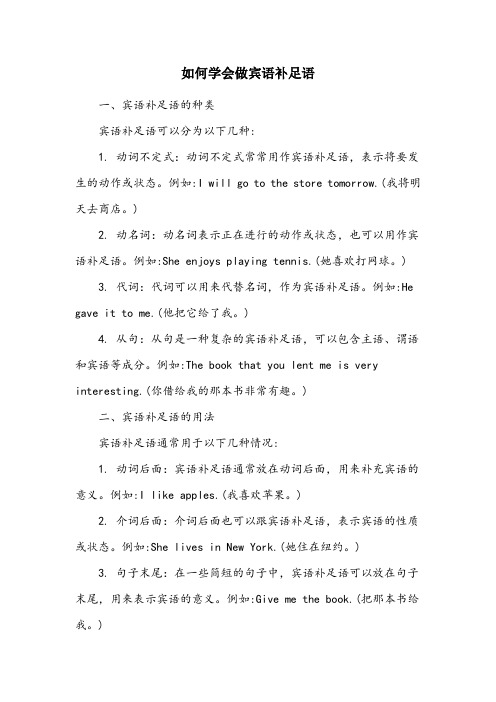
如何学会做宾语补足语一、宾语补足语的种类宾语补足语可以分为以下几种:1. 动词不定式:动词不定式常常用作宾语补足语,表示将要发生的动作或状态。
例如:I will go to the store tomorrow.(我将明天去商店。
)2. 动名词:动名词表示正在进行的动作或状态,也可以用作宾语补足语。
例如:She enjoys playing tennis.(她喜欢打网球。
)3. 代词:代词可以用来代替名词,作为宾语补足语。
例如:He gave it to me.(他把它给了我。
)4. 从句:从句是一种复杂的宾语补足语,可以包含主语、谓语和宾语等成分。
例如:The book that you lent me is very interesting.(你借给我的那本书非常有趣。
)二、宾语补足语的用法宾语补足语通常用于以下几种情况:1. 动词后面:宾语补足语通常放在动词后面,用来补充宾语的意义。
例如:I like apples.(我喜欢苹果。
)2. 介词后面:介词后面也可以跟宾语补足语,表示宾语的性质或状态。
例如:She lives in New York.(她住在纽约。
)3. 句子末尾:在一些简短的句子中,宾语补足语可以放在句子末尾,用来表示宾语的意义。
例如:Give me the book.(把那本书给我。
)三、练习下面是一些练习,可以帮助你掌握宾语补足语的用法:1. 填空:请根据句子的意思,选择合适的宾语补足语填空。
- I like ________ apples.(我喜欢苹果。
)- She lives in ________ New York.(她住在纽约。
)- He gave ________ it to me.(他把它给了我。
) 答案:apples, New York, it2. 改写句子:请将下面的句子改写成含有宾语补足语的形式。
- I like apples.(我喜欢苹果。
)- She lives in New York.(她住在纽约。
什么是句子宾语补足语举例

什么是句子宾语补足语举例句子是构成语言的基本单位,而句子中的词语则承担不同的语法角色,其中宾语是句子中的重要成分之一,可以进一步分为直接宾语和间接宾语。
当宾语被修饰或补足时,我们将其称为宾语补足语。
本文将介绍宾语补足语的定义以及举例说明其具体用法。
一、什么是宾语补足语宾语补足语通常由形容词、副词、介词短语、不定式短语、从句等构成,它的作用是对宾语进行进一步说明或补充性说明,起到修饰宾语的作用,并在一定程度上影响句子的意义。
在英语中,宾语补足语可以出现在及物动词后面,也可以出现在介词之后。
而在中文中,宾语补足语通常出现在动词后面。
二、例子说明1. 形容词宾语补足语形容词是最常见的宾语补足语之一,通常用于对宾语进行进一步的描述或说明,例如:例如:a. 他认为自己是最幸福的人。
在这个句子中,形容词“幸福”的作用就是对“他自己”这个宾语进行了修饰,使得整个句子更明确。
b. 她觉得自己的美丽可以超越时间。
这个例子中,“美丽”是形容词宾语补足语,它说明了“她自己”这个宾语的特点和特质。
2. 不定式宾语补足语不定式一般指的是“to+动词”的形式,作为宾语补足语时,它的作用是对宾语进行一些必要的解释和说明。
例如:a. 他不喜欢和别人争吵。
在这个句子中,“和别人争吵”的意义就被不定式“争吵”所补足,“争吵”是宾语补足语。
b. 他已经下定决心去留学。
这个例子中,“去留学”是一个不定式,作为宾语补足语,它表明了“他”的决定和行动。
3. 介词短语宾语补足语介词短语也是宾语补足语的一种形式,它的作用是对宾语进行修饰和进一步的解释。
例如:a. 学校需要大量的教师。
在这个句子中,介词短语“of teachers”是宾语补足语,不仅进一步解释了“大量”这个宾语的概念,还说明了学校有什么需要。
b. 她对这个问题很感兴趣。
介词短语“对这个问题”的作用是对宾语“兴趣”进行进一步的解释,让整个句子更加精确明了。
三、总结通过上述例子可以发现,宾语补足语在句子中起着非常重要的作用,能够让句子的意义更加明确,语法更加规范,让读者更好地理解句子的内涵。
宾语补足语
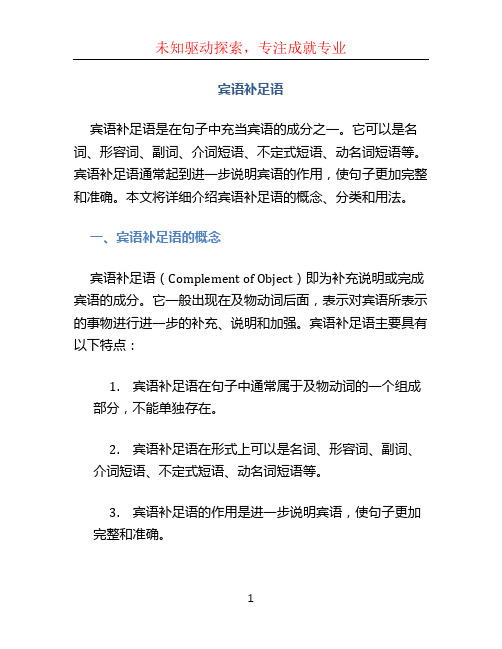
宾语补足语宾语补足语是在句子中充当宾语的成分之一。
它可以是名词、形容词、副词、介词短语、不定式短语、动名词短语等。
宾语补足语通常起到进一步说明宾语的作用,使句子更加完整和准确。
本文将详细介绍宾语补足语的概念、分类和用法。
一、宾语补足语的概念宾语补足语(Complement of Object)即为补充说明或完成宾语的成分。
它一般出现在及物动词后面,表示对宾语所表示的事物进行进一步的补充、说明和加强。
宾语补足语主要具有以下特点:1.宾语补足语在句子中通常属于及物动词的一个组成部分,不能单独存在。
2.宾语补足语在形式上可以是名词、形容词、副词、介词短语、不定式短语、动名词短语等。
3.宾语补足语的作用是进一步说明宾语,使句子更加完整和准确。
二、宾语补足语的分类根据宾语补足语所表示的内容,可以将宾语补足语分为以下几类:1. 名词性宾语补足语名词性宾语补足语是宾语的补足语是一个名词,用来对宾语进行进一步说明和补充。
常见的名词性宾语补足语有:•名词:我认为他是个天才。
•代词:我发现他是我。
•数词:他们选了三个代表。
2. 形容词性宾语补足语形容词性宾语补足语是宾语的补足语是一个形容词,用来对宾语进行进一步形容和补充。
常见的形容词性宾语补足语有:•形容词:我觉得那个电影很好看。
•分词:她把钱数得仔细。
•介词短语:他们把书放在桌子上。
3. 副词性宾语补足语副词性宾语补足语是宾语的补足语是一个副词,用来对宾语进行进一步说明和补充。
常见的副词性宾语补足语有:•副词:请你关好窗户。
•介词短语:他把字写在纸上。
4. 不定式宾语补足语不定式宾语补足语是宾语的补足语是一个不定式,用来对宾语进行进一步说明和补充。
常见的不定式宾语补足语有:•动词不定式:我打算去旅行。
•动词短语:她喜欢看电视。
5. 动名词宾语补足语动名词宾语补足语是宾语的补足语是一个动名词或者动词+ing形式,用来对宾语进行进一步说明和补充。
常见的动名词宾语补足语有:•动名词:我喜欢学习英语。
英语宾语补足语用法详解

Contents之袁州冬雪创作英语宾语补足语用法详解 (1)一、概念 (1)二、何时用现在分词、何时用过去分词作主语(宾语)补足语.. 2三、可以用分词作主语或宾语补足语的动词 (3)典例精析: (5)英语宾语补足语用法详解一、概念分词作主语补足语和宾语补足语其实是同一成分用于两种分歧的句式中.详细地说,主动态句子中的宾语补足语就是主动态句子中的主语补足语.先懂得宾语补足语,则很容易懂得主语补足语.宾语补足语:在英语中,某些及物动词不但需要宾语,而且还要求某个词或词组来补偿说明宾语,即暗示宾语代表的人或物所发出的动作或所处的状态,这个词或短语称为宾语补足语.有些语法书把宾语和补足语称为复合宾语.句型:及物动词+宾语(n./pron.)+宾语补足语(n./adj./adv./todo/-ing/-ed/介词短语共7种暗示法)该句型若变成主动语态,即将宾语提到句首作主语,原主动语态中的宾语补足语此时在主动语态中起到补偿说明主语的作用,所以改称主语补足语.例如:A cook will be immediately fired if he is foundsmoking in the kitchen.此句中smoking是主语he的补足语,所以称为主语补足语.二、何时用现在分词、何时用过去分词作主语(宾语)补足语分词作主语(宾语)补足语时,若主语(宾语)与分词之间是主动关系,则用现在分词暗示主动;如果主语(宾语)与分词之间是主动关系,则用过去分词暗示主动.例如:He was heard singing in the next room.He was singing.主语he与补足语“唱歌”之间是主动关系,故用现在分词singing.One of the glasses was found broken.One of the glasses was broken.主语one of the glasses与补足语“打破”之间是主动关系,故用过去分词broken.Don‘t leave the water running while you brush yourteeth.The water is running.宾语the water与补足语“淌”之间是主动关系,故用现在分词running.三、可以用分词作主语或宾语补足语的动词要会使用分词作补足语,必须记住哪些动词可以接分词充当补足语.1.感官动词feel,hear,listen to,see,watch,notice,observe,look at(一感二听五看)及find等既可以接现在分词又可以接过去分词充当补足语.如:If you wave your book in front of your face,you can feel the air moving against your face.The air can be felt moving against your face,if you wave your book in front of your face.The next morning she found the man lying in bed,dead. The next morning the man was found lying in bed,dead.2.暗示“致使”动词get,have,leave等既可以接现在分词又可以接过去分词充当补足语.--Good morning.Can I help you?--I’d like to have the package weighed,madam.3.暗示“意欲;饬令”的动词如like,want,wish,order等常接过去分词充当补足语.如:You must tell us exactly what you would like done.你必须准确地告诉我们该做什么.The father wants his daughter taught the piano.这位父亲想让女儿学钢琴.I wish it done quickly.我希望很快将此事做完.注意:set,start,catch常跟现在分词作宾语补足语,make常跟过去分词作宾语补足语.如:Set sb.thinking,start sb.coughing,He looked around and caught a man putting his handinto the pocket of a passenger.The speaker raised his voice but still couldn’t make himself heard.典例精析:1.I smell something___________in the kitchen.Can Icall you back in a minute?A.burningB.burntC.being burntD.to be burnt答案:A.解析:smell something burning“闻着什么东西在燃烧而发出糊味”强调这个动作正在停止.burning作宾语补足语.Something bu rnt“烧焦了的东西”暗示一种状态.所以选A.2.After a knock at the door,the child heard hismother’s voice______him.A.callingB.calledC.being calledD.to call答案:A.解析:hearsb.doingsth.意为“听到或人在做某事”.动词+ing暗示主动,the child heard his mother’svoice calling him暗示“孩子听见他母亲喊他”.Hear sth.done暗示“听见某事被做了”.所以选A.3.Jenny hopes that Mr.Smith will suggest a good way to have her written English_____in a short period.答案:A.解析:havesth.done暗示“使某事被做”,have her written English improved“使她的书面英语得到提高”.动词+ed形式作宾语补足语暗示主动.Have sb.doingsth.意为“使或人一直在做某事”表主动.Have sb.do sth.意为“使或人做某事”表主动,do前必须省略to.所以选A.4.--Did Peter fix the computer himself?--He______,because he doesn’t know much aboutcomputers.A.has it fixedB.had fixed itC.had it fixedD.fixedit答案:C.解析:havesth.done暗示“使某事被做或请他人做某事”,动词+ed形式作宾语补足语暗示主动.由because he doesn’t know much about computers可断定出,他找他人维修了电脑.所以选C.。
宾语补足语讲解
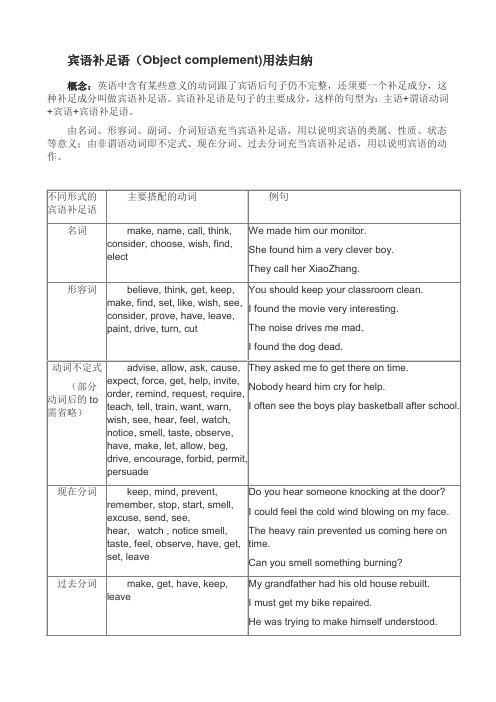
宾语补足语(Object complement)用法归纳概念:英语中含有某些意义的动词跟了宾语后句子仍不完整,还须要一个补足成分,这种补足成分叫做宾语补足语。
宾语补足语是句子的主要成分,这样的句型为:主语+谓语动词+宾语+宾语补足语。
由名词、形容词、副词、介词短语充当宾语补足语,用以说明宾语的类属、性质、状态等意义;由非谓语动词即不定式、现在分词、过去分词充当宾语补足语,用以说明宾语的动作。
①当感官动词和使役动词,如:see hear notice watch hear observe, listen to, feel(感官动词)make have let get(使役动词)接宾补时,不定式的符号to必须省略。
但在被动语态中,动词后要加to。
主动语态:The policeman made him tell everything.被动语态:He was made to tell everything by the policeman.②感官动词see, hear, watch, notice, observe后面的宾语补足语既可跟不带to的动词不定式,也可跟现在分词,其区别在于前者表示“经常性的,习惯性的动作”,后者表示“正在发生的瞬间动作”。
I often hear her sing English songs in the room.Suddenly, Zhang Hua heard someone shouting “Fire! Fire!”③在help后,不定式可以带to,也可不带。
Lucy often helps her brother (to) learn English.④有些动词只能用现在分词作宾语补足语,如:keep, mind, prevent, stop。
动词find, catch等的宾语可由现在分词作宾语补足语。
She caught her son smoking a cigarette.We’d be tter keep the fire burning.I don’t mind you joking. I like it.The heavy rain prevented us coming here on time.I found him drinking my whisky.⑤hope, demand, suggest等动词后面不能接不定式作宾语补足语。
什么是宾语补足语
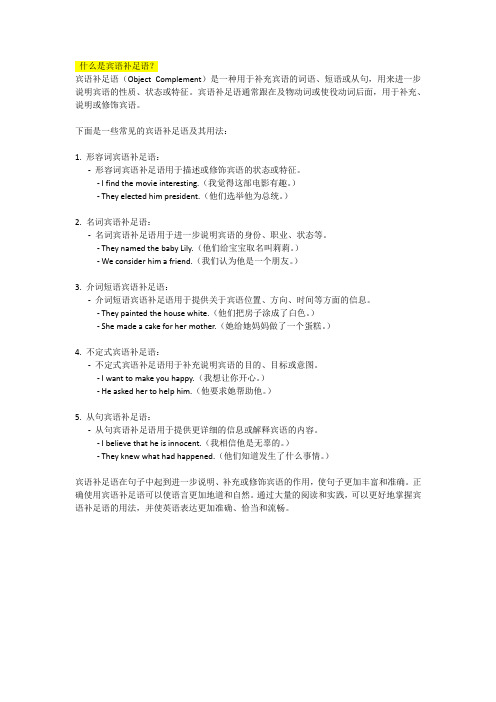
什么是宾语补足语?宾语补足语(Object Complement)是一种用于补充宾语的词语、短语或从句,用来进一步说明宾语的性质、状态或特征。
宾语补足语通常跟在及物动词或使役动词后面,用于补充、说明或修饰宾语。
下面是一些常见的宾语补足语及其用法:1. 形容词宾语补足语:-形容词宾语补足语用于描述或修饰宾语的状态或特征。
- I find the movie interesting.(我觉得这部电影有趣。
)- They elected him president.(他们选举他为总统。
)2. 名词宾语补足语:-名词宾语补足语用于进一步说明宾语的身份、职业、状态等。
- They named the baby Lily.(他们给宝宝取名叫莉莉。
)- We consider him a friend.(我们认为他是一个朋友。
)3. 介词短语宾语补足语:-介词短语宾语补足语用于提供关于宾语位置、方向、时间等方面的信息。
- They painted the house white.(他们把房子涂成了白色。
)- She made a cake for her mother.(她给她妈妈做了一个蛋糕。
)4. 不定式宾语补足语:-不定式宾语补足语用于补充说明宾语的目的、目标或意图。
- I want to make you happy.(我想让你开心。
)- He asked her to help him.(他要求她帮助他。
)5. 从句宾语补足语:-从句宾语补足语用于提供更详细的信息或解释宾语的内容。
- I believe that he is innocent.(我相信他是无辜的。
)- They knew what had happened.(他们知道发生了什么事情。
)宾语补足语在句子中起到进一步说明、补充或修饰宾语的作用,使句子更加丰富和准确。
正确使用宾语补足语可以使语言更加地道和自然。
通过大量的阅读和实践,可以更好地掌握宾语补足语的用法,并使英语表达更加准确、恰当和流畅。
宾语补足语七种类型英语举例
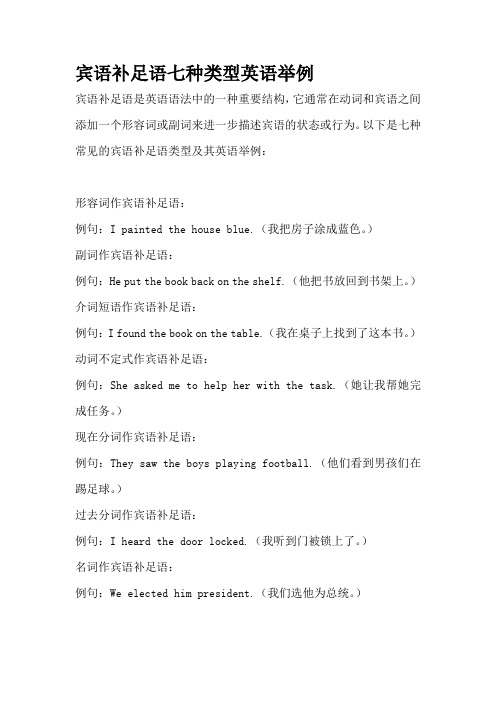
宾语补足语七种类型英语举例
宾语补足语是英语语法中的一种重要结构,它通常在动词和宾语之间添加一个形容词或副词来进一步描述宾语的状态或行为。
以下是七种常见的宾语补足语类型及其英语举例:
形容词作宾语补足语:
例句:I painted the house blue.(我把房子涂成蓝色。
)
副词作宾语补足语:
例句:He put the book back on the shelf.(他把书放回到书架上。
)介词短语作宾语补足语:
例句:I found the book on the table.(我在桌子上找到了这本书。
)动词不定式作宾语补足语:
例句:She asked me to help her with the task.(她让我帮她完成任务。
)
现在分词作宾语补足语:
例句:They saw the boys playing football.(他们看到男孩们在踢足球。
)
过去分词作宾语补足语:
例句:I heard the door locked.(我听到门被锁上了。
)
名词作宾语补足语:
例句:We elected him president.(我们选他为总统。
)
这些是七种常见的宾语补足语类型,每种都有不同的用法和特点。
理解这些结构可以帮助更好地掌握英语语法。
宾语从句和宾语补足语的区别

宾语从句和宾语补足语的区别摘要:一、宾语从句和宾语补足语的定义与区别1.宾语从句2.宾语补足语二、宾语从句的应用场景1.疑问句2.否定句3.祈使句三、宾语补足语的类型及用法1.结果补足语2.状态补足语3.趋向补足语四、如何正确使用宾语从句和宾语补足语1.语法规则2.语义搭配五、练习与总结正文:一、宾语从句和宾语补足语的定义与区别1.宾语从句宾语从句是指在一个复合句中,作为动词、形容词、副词等词的宾语的部分,通常由连词、疑问词等引导。
它与主句中的主语、谓语等成分相对应,起到补充说明的作用。
如:- I don"t know what he said.(我不知道他说了什么。
)2.宾语补足语宾语补足语是指在复合句中,动词的宾语部分补充说明宾语的状态、结果或趋向等语义信息。
它通常由介词、副词等引导。
如:- He looked the book up and down.(他翻阅了这本书。
)二、宾语从句的应用场景1.疑问句在疑问句中,通常用宾语从句来提问。
如:- What did he say?(他说了什么?)2.否定句在否定句中,宾语从句用来表示否定的对象。
如:- I didn"t buy anything.(我没有买任何东西。
)3.祈使句在祈使句中,宾语从句用来表示命令或请求的对象。
如:- Bring me the dictionary.(把字典给我带来。
)三、宾语补足语的类型及用法1.结果补足语结果补足语表示宾语所处的状态或结果。
如:- He made the cake rise.(他使蛋糕发酵。
)2.状态补足语状态补足语表示宾语的状态。
如:- She left the room quietly.(她安静地离开了房间。
)3.趋向补足语趋向补足语表示宾语的动作方向。
如:- He put the letter on the table.(他把信放在桌子上。
)四、如何正确使用宾语从句和宾语补足语1.语法规则在使用宾语从句和宾语补足语时,需要注意以下语法规则:- 宾语从句的引导词:连词(如that、whether等)、疑问词(如what、who等)。
宾语补足语

宾语补足语宾语补足语是由及物动词或者介词所引导的一个补足成分,用来补充说明宾语所表示的动作或状态。
在句中,宾语补足语紧跟在宾语后面,起到进一步说明宾语的作用。
宾语补足语在英语和汉语中都存在,本文将分别从英语和汉语的角度探讨宾语补足语的特点和用法。
英语中的宾语补足语英语中的宾语补足语通常由形容词、副词、介词短语、不定式或从句组成。
它们用来修饰或者补充说明宾语的特征、状态、性质等。
1.形容词:当及物动词的宾语是名词时,形容词可以用来修饰宾语。
例如:–She found the movie interesting.(她觉得这部电影很有趣。
)–They consider him responsible for the accident.(他们认为他对这起事故负有责任。
)2.副词:副词可以修饰宾语表示动作的方式、程度等。
例如:–He eats the cake happily.(他开心地吃着蛋糕。
)–They played football together.(他们一起踢足球。
)3.介词短语:介词短语可以用来表示动作的方向、地点等。
例如:–He put the book on the table.(他把书放在桌子上。
)–They went swimming in the river.(他们去河里游泳。
)4.不定式:不定式可以表示动作的目的、用途等。
例如:–She wants to buy a new car to drive to work.(她想买一辆新车用来上班。
)–They need some tools to fix the broken bike.(他们需要一些工具来修理坏了的自行车。
)5.从句:从句可以用来充当宾语的补足语,表示宾语的内容。
例如:–They said that they would come tomorrow.(他们说他们明天会来。
)–She wonders if he loves her.(她想知道他是否爱她。
宾语补足语用法归纳精讲
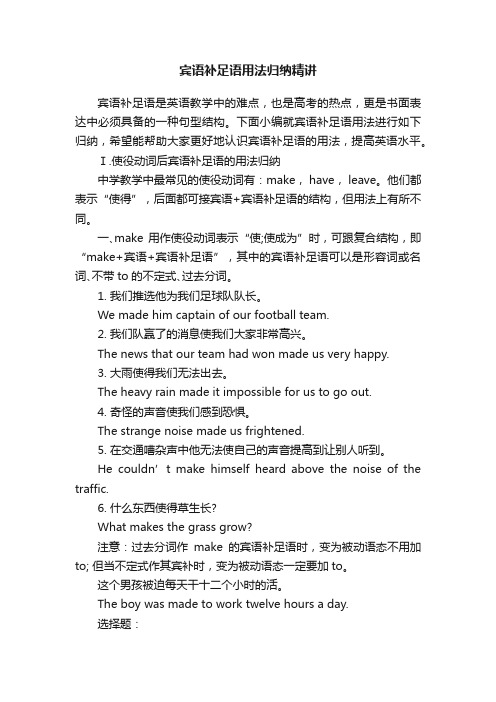
宾语补足语用法归纳精讲宾语补足语是英语教学中的难点,也是高考的热点,更是书面表达中必须具备的一种句型结构。
下面小编就宾语补足语用法进行如下归纳,希望能帮助大家更好地认识宾语补足语的用法,提高英语水平。
Ⅰ.使役动词后宾语补足语的用法归纳中学教学中最常见的使役动词有:make, have, leave。
他们都表示“使得”,后面都可接宾语+宾语补足语的结构,但用法上有所不同。
一、make用作使役动词表示“使;使成为”时,可跟复合结构,即“make+宾语+宾语补足语”,其中的宾语补足语可以是形容词或名词、不带to的不定式、过去分词。
1. 我们推选他为我们足球队队长。
We made him captain of our football team.2. 我们队赢了的消息使我们大家非常高兴。
The news that our team had won made us very happy.3. 大雨使得我们无法出去。
The heavy rain made it impossible for us to go out.4. 奇怪的声音使我们感到恐惧。
The strange noise made us frightened.5. 在交通嘈杂声中他无法使自己的声音提高到让别人听到。
He couldn’t make himself heard above the noise of the traffic.6. 什么东西使得草生长?What makes the grass grow?注意:过去分词作make的宾语补足语时,变为被动语态不用加to; 但当不定式作其宾补时,变为被动语态一定要加to。
这个男孩被迫每天干十二个小时的活。
The boy was made to work twelve hours a day.选择题:1. Paul doesn’t have to be made ____. He always works hard.A. learnB. to learnC. learnedD. learning2. The result of the entrance exams was not made ____ to the public until last Thursday.A. knowingB. knownC. to knowD. to be known答案:1.B2.B二、have 表示“使得……”,其后接宾语补足语,常用以下句型:have sb. do sth.使得某人做某事have sb. doing sth.使得某人一直做某事have sth. done使得某事被做填空:1. The teacher had her ____(recite) the text again.2. He wants to have his eyes ____(examine) tomorrow.3. Be careful,or you’ll have your hands ____(hurt).4. He had the girl ____(stand) in the classroom the whole morning.5. He had the walls ____(paint) this morning.答案:1.recite 2.examined 3.hurt 4.standing 5.painted只能用doing的情况1. 表示正在发生Be quick. They have the car waiting for you at the school gate.2. 否定句中表示(不能)容忍某人做……I won’t have him cheating in the exam.3. 表示某一时间内一直延续不断的动作He had us laughing all through the meals.选择、填空题:1. I’ve had my radio ____ so soon because my father had me ____ it. A. repair; done B. repaired; do C. repairing; do D. repaired; done2. You can’t have the horse ____ all the way. It’s too hot.A. runB. to runC. runningD. to be running3. Mrs. Brown was much disappointed to see the washing machine she had had ____ went wrong again.A. itB. it repairedC. repairedD. to be repaired4. We will have you ____(know) that the machine has been made ____(work) at full speed.答案:1.B 2.C 3.C 4.know, to work三、leave作使役动词,表示“使/让……保持某种状态”。
宾语补足语怎么用

宾语补⾜语怎么⽤ 宾语补⾜语指在英语中有些及物动词,接了宾语意义仍不完整,还需要有⼀个其他的句⼦成分,来补充说明宾语的意义、状态等,以下是由店铺整理关于宾语补⾜语的⽤法的内容,希望⼤家喜欢! 宾语补⾜语的⽤法 1. 在表⽰⼼理状态的动词后作宾语补⾜语。
这类动词有:consider,think,believe,discover,find,imagine,judge,suppose,prove等。
这类动词后的不定式通常是“to be+形容词或名词”结构,think,consider,find后的to be常可省略。
We consider him (to be) a good teacher. 我们认为他是⼀个好⽼师。
2. 在表⽰情感状态的动词后作宾语补⾜语。
这类动词有:love,like,prefer,hate,want,wish,expect等。
I'd prefer you to leave him alone. 我希望你不要打扰他。
3. 注意:hope,demand,suggest等动词后⾯不能接不定式作宾语补⾜语。
I hope you can give me a hand. 我希望你能帮我⼀把。
使⽤宾语补⾜语的注意 当感官动词和使役动词,如: see,hear,notice,watch,feel,observe(感官动词)make,have,let,(使役动词)接宾语补⾜语时,不定式的符号to必须省略。
不定式作get的宾语补⾜语时不省略to 在help后,不定式可以带to,也可不带。
补充:简单句常见结构有: “主语+谓语”结构:句⼦由主语和谓语两部分构成,谓语动词是不及物动词。
“主语+谓语+宾语”结构:谓语动词是及物动词,后⾯接有宾语。
“主语+系动词+表语”结构:表语通常是名词或形容词。
“主语+谓语+间接宾语+直接宾语”结构:谓语动词是及物动词。
“主语+谓语+宾语+宾语补⾜语”结构:有⼀些句⼦有了前3个成分后,还需要有⼀个宾语补⾜语对宾语做出补充说明,表明宾语的⾝份,特征等,使句意完整。
谈谈宾语补足语前置的九种情况

谈谈宾语补足语前置的九种情况宾语补足语是指在句子中充当宾语的补充说明或补充信息的成分。
在汉语中,宾语补足语通常位于宾语之后,起补充说明的作用。
然而,在某些情况下,宾语补足语也可以前置,即位于宾语之前。
下面将介绍九种情况下宾语补足语前置的用法。
一、形容词作宾语补足语前置形容词作为宾语补足语前置时,常用于表示感觉、状态或性质等方面。
例如:我觉得这个电影很好看。
我认为他很聪明。
二、名词作宾语补足语前置名词作为宾语补足语前置时,通常用于表示身份、职业、称号等。
例如:我把他当作我的老师。
他被推选为班长。
三、代词作宾语补足语前置代词作为宾语补足语前置时,常用于表示人或物的身份、性质等。
例如:我把它当作我的朋友。
他们把我当作一个外国人。
四、副词作宾语补足语前置副词作为宾语补足语前置时,常用于表示程度、方式等。
例如:我努力地学习。
他快速地跑过去。
五、介词短语作宾语补足语前置介词短语作为宾语补足语前置时,通常用于表示时间、地点、原因等。
例如:他在一天之内完成了任务。
他因为生病而缺席了会议。
六、不定式作宾语补足语前置不定式作为宾语补足语前置时,常用于表示目的、结果等。
例如:我帮助他学习英语。
他努力工作以实现自己的梦想。
七、动词短语作宾语补足语前置动词短语作为宾语补足语前置时,常用于表示行为、动作等。
例如:他习惯早起锻炼身体。
他开始学习弹钢琴。
八、形容词性的补足语作宾语补足语前置形容词性的补足语作为宾语补足语前置时,常用于表示感受、性质等。
例如:我发现这个问题很难解决。
他认为这个问题很重要。
九、名词性的补足语作宾语补足语前置名词性的补足语作为宾语补足语前置时,常用于表示身份、职业等。
例如:我把他当作我的导师。
他被评为最佳演员。
总结起来,宾语补足语前置的九种情况分别是形容词、名词、代词、副词、介词短语、不定式、动词短语、形容词性的补足语和名词性的补足语。
这些情况下,宾语补足语前置可以更加突出补充信息,丰富句子结构,使语言表达更加灵活多样。
宾语补足语是用来
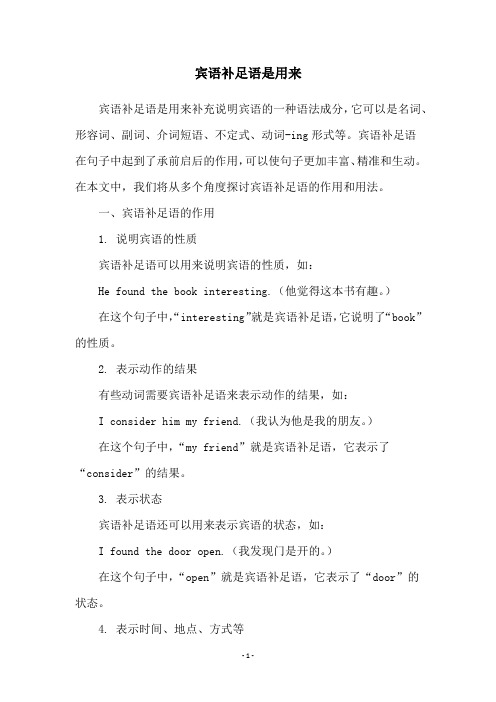
宾语补足语是用来宾语补足语是用来补充说明宾语的一种语法成分,它可以是名词、形容词、副词、介词短语、不定式、动词-ing形式等。
宾语补足语在句子中起到了承前启后的作用,可以使句子更加丰富、精准和生动。
在本文中,我们将从多个角度探讨宾语补足语的作用和用法。
一、宾语补足语的作用1. 说明宾语的性质宾语补足语可以用来说明宾语的性质,如:He found the book interesting.(他觉得这本书有趣。
)在这个句子中,“interesting”就是宾语补足语,它说明了“book”的性质。
2. 表示动作的结果有些动词需要宾语补足语来表示动作的结果,如:I consider him my friend.(我认为他是我的朋友。
)在这个句子中,“my friend”就是宾语补足语,它表示了“consider”的结果。
3. 表示状态宾语补足语还可以用来表示宾语的状态,如:I found the door open.(我发现门是开的。
)在这个句子中,“open”就是宾语补足语,它表示了“door”的状态。
4. 表示时间、地点、方式等宾语补足语还可以用来表示时间、地点、方式等,如:She painted the wall red.(她把墙刷成了红色。
)在这个句子中,“red”就是宾语补足语,它表示了“paint”的方式。
二、宾语补足语的用法1. 名词作宾语补足语名词作宾语补足语时,通常放在宾语后面,并且用来说明宾语的性质、状态、地点等,如:I found the book on the desk.(我在桌子上找到了这本书。
)在这个句子中,“on the desk”就是宾语补足语,它表示了“book”的地点。
2. 形容词作宾语补足语形容词作宾语补足语时,通常放在宾语后面,并且用来说明宾语的性质、状态等,如:I consider him honest.(我认为他很诚实。
)在这个句子中,“honest”就是宾语补足语,它表示了“him”的性质。
宾语补足语知识点总结

宾语补足语知识点总结一、不定式作宾语补足语1. 不定式作宾语补足语的用法不定式作宾语补足语时,它通常跟在及物动词后面,用来说明动作的目的或目标。
例如:- I want to learn English.- He likes to play basketball.- She needs to finish her homework.2. 不定式作宾语补足语的形式不定式有两种形式:带to的一般式和省略to的不定式。
例如:- I want to go to the library. (带to的一般式)- He needs to study for the exam. (带to的一般式)- She likes swimming. (省略to的不定式)3. 表示感官、情感、思维等动词后的不定式宾语补足语- feel, hear, listen to, notice, see, watch, observe, smell, think, believe, consider, expect, find, know, understand, want, like, love, hate, etc.例如:- I heard her sing the song.- She likes to read novels in her free time.- He found it difficult to solve the problem.4. 表示目的、意图或计划后的不定式宾语补足语- aim, attempt, decide, determine, hope, intend, plan, promise, refuse, try, wish, etc.例如:- He decided to buy a new car.- She promised to finish the project on time.- They plan to go on a trip next month.5. 表示请求、要求或命令后的不定式宾语补足语- advise, allow, ask, invite, command, encourage, force, forbid, instruct, need, order, permit, remind, require, tell, urge, want, etc.例如:- I asked her to help me with my homework.- She reminded him to call his mother.- The teacher required the students to submit their assignments on time.二、动名词作宾语补足语1. 动名词作宾语补足语的用法动名词作宾语补足语时,它通常跟在及物动词后面,用来说明动作的目的或目标。
宾语补足语的用法课件

目录
• 宾语补足语的定义与作用 • 宾语补足语的类型与构成 • 宾语补足语的用法与例句 • 宾语补足语的常见问题与纠正方法 • 宾语补足语的练习题与解析 • 总结与回顾
01
宾语补足语的定义与作用
定义解释
定义
宾语补足语是句子中的一种重要成分,通常用来补充说 明宾语的状态、性质或身份等。
用法
在句子中,形容词补足语 可以表示事物的状态、性 质等。
例句
The book is interesting. (这本书很有趣。)
宾语补足语的常见问题与纠
04
正方法
主语补足语的常见问题与纠正方法
主语补足语缺失
主语补足语搭配不当
句子中缺少主语补足语,导致句子结 构不完整。例如,“他很帅”应该补 充为“他是一个很帅的人”。
THANKS
感谢观看
主语补足语是补充主语信息的,通常出现在主语后。
详细描述
主语补足语通常是形容词或名词短语,用于描述主语的状态或属性。例如, “John is a student.” 中,“a student”是主语补足语,描述了约翰的身份 。
动词补足语的练习题与解析
总结词
动词补足语是补充动词信息的,通常出现在动词后。
03 语法要求
在某些语言中,使用宾语补足语是语法的要求, 如果省略了宾语补足语,句子可能会不符合语法 规则。
02
宾语补足语的类型与构成
主语补足语
定义
主语补足语是补充主语的信息,它位于主语之后 ,并与主语形成逻辑上的主谓关系。
例子
The company(主语) was founded in 1995 (主语补足语).
01
02
宾语补足语
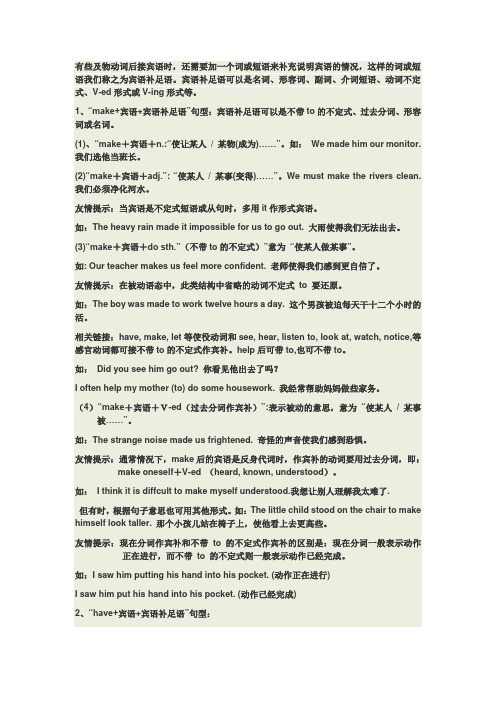
有些及物动词后接宾语时,还需要加一个词或短语来补充说明宾语的情况,这样的词或短语我们称之为宾语补足语。
宾语补足语可以是名词、形容词、副词、介词短语、动词不定式、V-ed形式或V-ing形式等。
1、“make+宾语+宾语补足语”句型:宾语补足语可以是不带to的不定式、过去分词、形容词或名词。
(1)、“make+宾语+n.:“使让某人/ 某物(成为)……”。
如:We made him our monitor. 我们选他当班长。
(2)“make+宾语+adj.”: “使某人/ 某事(变得)……”。
We must make the rivers clean. 我们必须净化河水。
友情提示:当宾语是不定式短语或从句时,多用it作形式宾语。
如:The heavy rain made it impossible for us to go out. 大雨使得我们无法出去。
(3)“make+宾语+do sth.”(不带to的不定式)”意为“使某人做某事”。
如: Our teacher makes us feel more confident. 老师使得我们感到更自信了。
友情提示:在被动语态中,此类结构中省略的动词不定式to 要还原。
如:The boy was made to work twelve hours a day. 这个男孩被迫每天干十二个小时的活。
相关链接:have, make, let等使役动词和see, hear, listen to, look at, watch, notice,等感官动词都可接不带to的不定式作宾补。
help后可带to,也可不带to。
如:Did you see him go out? 你看见他出去了吗?I often help my mother (to) do some housework. 我经常帮助妈妈做些家务。
(4)“make+宾语+V-ed(过去分词作宾补)”:表示被动的意思,意为“使某人/ 某事被……”。
宾语补足语

可以充当宾语补足语的词和词组有:
3-4.副词和介词短语也可以充当
宾语补足语,如:
put them away, please.
she found the dog under the tree.
可以充当宾语补足语的词和词组有:
5. 动词不定式:(to do /do) Nobody could make him change
V-ing形式作宾语补足语表示的是一 个正在进行的主动动作。常见的可 以接V-ing形式作宾语补足语的动词 有两类: (1)感官动词,如:see, hear, watch feel, (2)部分使役动词 keep...
可以充当宾语补足语的词和词组有:
6(2). 过去分词: He watched the TV set carried
oeak English, be sure to make yourself understood.
V-ed形式作宾语补足语表示一
个已经完成或被动的动作。能 接V-ed形式作宾语补足语的动 词也分为两类:感官动词和部
分使役动词。(同2)
宾语补足语 的用法
1.“宾语补足语”放在宾语后面用
来补充说明宾语所表示的人或事 物所发出来的动作,或者说明宾
语的状语的特征,身份等。
2.句子的基本结构 主语+谓语+宾语+宾语补足语
宾语和其补足语之间的逻辑关系:
当名词、形容词、副词和介词短语充当宾语补足语时,它们和宾语 之间有着逻辑上的主谓关系(或称表语关系),若无宾语补足语, 则句意不完整。宾语补足语说明宾语的情况、性质、特征、状态、 身份或属类等。试比较: We made him our monitor. (He is our monitor.) You should keep your room clean . (Your room is clean .) We could hear the children playing outside. (The children are playing outside.)
宾语补足语的种类和用法

宾语补足语的种类和用法宾语补足语是指在句子中用来补充说明动词的宾语的成分,它可以是名词、形容词、副词、介词短语等。
宾语补足语的种类和用法涉及到语法的一些细节和规则,下面将对此进行详细讨论。
一、名词性宾语补足语名词性宾语补足语是句子中的宾语补充说明名词,可以是名词、代词、不定式、动名词等。
1.名词宾语补足语名词宾语补足语一般由名词组成,用来进一步说明宾语。
例如:He considered the book a gift.(他把这本书视为一份礼物。
)They elected him chairman.(他们选他当了主席。
)2.代词宾语补足语代词宾语补足语可以是代词,用来补充说明宾语。
例如:I find it hard to understand.(我发现很难理解。
)We made her our leader.(我们让她成为我们的领导。
)3.不定式宾语补足语不定式宾语补足语是用不定式形式的动词来作宾语补充说明宾语。
例如:I want to be a doctor.(我想成为一名医生。
)She asked me to help.(她让我帮忙。
)4.动名词宾语补足语动名词宾语补足语用动名词形式的动词来作宾语补充说明宾语。
例如:I enjoy swimming.(我喜欢游泳。
)They don't mind waiting.(他们不介意等待。
)二、形容词性宾语补足语形容词性宾语补足语是用形容词来修饰宾语,进一步说明宾语的特征。
1.表语形容词作宾语补足语表语形容词作宾语补足语用来补充说明宾语的状态或特征。
例如:She found the movie boring.(她觉得这部电影很无聊。
)We consider him intelligent.(我们认为他聪明。
)2.定语形容词作宾语补足语定语形容词作宾语补足语用来修饰宾语的性质或特点。
例如:They found the city beautiful.(他们觉得这个城市很美。
- 1、下载文档前请自行甄别文档内容的完整性,平台不提供额外的编辑、内容补充、找答案等附加服务。
- 2、"仅部分预览"的文档,不可在线预览部分如存在完整性等问题,可反馈申请退款(可完整预览的文档不适用该条件!)。
- 3、如文档侵犯您的权益,请联系客服反馈,我们会尽快为您处理(人工客服工作时间:9:00-18:30)。
宾语补足语用法宾语补足语是英语教学中的难点,也是高考的热点,更是书面表达中必须具备的一种句型结构。
下面就宾语补足语用法进行以下归纳。
Ⅰ.使役动词后宾语补足语的用法中学教学中最常见的使役动词有:make,have,leave。
他们都表示“使得”,后面都可接宾语+宾语补足语的结构,但用法上有所不同。
一、make用作使役动词表示“使;使成为”时,可跟复合结构,即“make+宾语+宾语补足语”,其中的宾语补足语可以是形容词或名词、不带to的不定式、过去分词。
1. 我们推选他为我们足球队队长。
We made him captain of our football team.2. 我们队赢了的消息使我们大家非常高兴。
The news that our team had won made us very happy.3. 大雨使得我们无法出去。
The heavy rain made it impossible for us to go out.4. 奇怪的声音使我们感到恐惧。
The strange noise made us frightened.5. 在交通嘈杂声中他无法使自己的声音提高到让别人听到。
He couldn’t make himself heard above the noise of the traffic.6. 什么东西使得草生长?What makes the grass grow?注意:过去分词作make的宾语补足语时,变为被动语态不用加to;但当不定式作其宾补时,变为被动语态一定要加to。
这个男孩被迫每天干十二个小时的活。
The boy was made to work twelve hours a day.选择题:1. Paul doesn’t have to be made ____. He always works hard.A. learnB. to learnC. learnedD. learning2. The result of the entrance exams was not made ____ to the public until last Thursday.A. knowingB. knownC. to knowD. to be known答案:1.B2.B二、have 表示“使得……”,其后接宾语补足语,常用以下句型:have sb. do sth.使得某人做某事have sb. doing sth.使得某人一直做某事have sth. done使得某事被做填空:1. The teacher had her ____(recite) the text again.2. He wants to have his eyes ____(examine) tomorrow.3. Be careful,or you’ll have your hands ____(hurt).4. He had the girl ____(stand) in the classroom the whole morning.5. He had the walls ____(paint) this morning.答案:1.recite 2.examined 3.hurt 4.standing 5.painted只能用doing的情况1. 表示正在发生Be quick. They have the car waiting for you at the school gate.2. 否定句中表示(不能)容忍某人做……I won’t have him cheating in the exam.3. 表示某一时间内一直延续不断的动作He had us laughing all through the meals.选择、填空题:1. I’ve had my radio ____ so soon because my father had me ____ it. A. repair;done B. repaired;do C. repairing;do D. repaired;done2. You can’t have the horse ____ all the way. It’s too hot.A. runB. to runC. runningD. to be running3. Mrs. Brown was much disappointed to see the washing machine she had had ____ went wrong again.A. itB. it repairedC. repairedD. to be repaired4. We will have you ____(know) that the machine has been made ____(work) at full speed.答案:1.B 2.C 3.C 4.know,to work三、leave作使役动词,表示“使/让……保持某种状态”。
1. 用形容词作宾语补足语出去时,不要关门。
Leave the door open when you go out.他的疾病使得他身体很虚弱。
His illness left him very weak.2. 还可用名词、介词短语等作宾语补足语他父母去年双双去世,留下他成为一个孤儿。
His parents both died last year,leaving him an orphan.3. 用现在分词作宾语补足语他们走开了,让我一个人坐在那儿。
They walked off and left me sitting there alone.他出去时,把他的文件摊在桌子上。
He went out,leaving his papers lying open on the desk.4. 用过去分词作宾语补足语Did you leave the doors and windows properly fastened?He left a few questions unanswered.Ⅱ.感官动词后宾语补足语的用法表示感觉和心理状态的动词,如hear,feel,find,listen to,look at,watch,notice,observe,smell,see等词后可以用省去to的动词不定式,现在分词及过去分词作宾语补足语。
常见的句型有:(以hear为例)hear sb. do sth.hear sth. done填空、选择题:1. I’ve never heard the song ____(sing).2. Do you smell something ____(burn)?3. Tom saw his parents ____(get) into the car and ____(drive) off.4. He was seen ____(drive) the car at high speed on the highway yesterday.5. The managers discussed the plan that they would like to see ____next year.6. ——Did you hear her ____ this pop song this time the other day?——Yes,and I heard this song ____ in English.A. sing;singingB. sung;sungC. sung;singingD. singing;sung7. I saw her ____ when I came into the classroom.A. cryB. to cryC. cryingD. cries答案:1.sung 2.burning 3.get;drive 4.to drive 5.C 6.D 7.CⅢ.with+宾语+宾语补足语的结构1. with+宾语+形容词/副词/介词短语1) 他过去常常开着窗子睡觉。
He used to sleep with the window open.2) 他们离开了房间,灯还亮着。
They fled the room with lights still on.3) 他双手放在口袋里走了进来。
He stepped in,with his hands in his pockets.4) 脖子上没带项链的那位女士是玛丽的朋友。
The woman,without a necklace around her neck,was a friend of Mary’s.2. with+宾语+doing/done/to do1) The day was bright with a fresh breeze blowing.(-ing表示主动/正在进行)2) With the matter settled,we went home. (-ed表示被动/状态)3) They are highly mechanized farms,with machines to do all the work.4) With Tom to help me,I can finish the work in time.(to do表示即将发生)选择、填空题:1. ____ production up by 60%,the company has had another excellent year.A. AsB. ForC. WithD. Through2. ____ everything ____,she left the supermarket with satisfaction.A. As;buyingB. For;to buyC. With;boughtD. Because;to buy比较:____ everything was bought,she left the supermarket.3. ____ years ____,her hair grows white.A. As;passing byB. With;go byC. As;passD. With;passed4. His mother ____(be) ill,he had to stay at home,looking after her.5. He stood there,with his eyes ____(fix) on Della.6. He stood there,____(fix) his eyes on Della.7. He stood there and his eyes ____(fix) on Della.答案:1.C 2.C 比较As 3.C 4.being 5.fixed 6.fixing 7.were fixed宾语补足语练习题1. The manager discussed the plan that they would like to see the next year.(NMET2000)2. ----There’s a hole in your bag. ---- I know, I’m going to have it _____.mend B. mending C. mended D. to be mended3. Though he had often made his little sister ____, today he was made ____ by his little sister.cry; to cry B. crying; crying C. cry; cry D. to cry; cry4. They would not allow him _____ across the enemy line.to risk going B. risking to go C. for risk to go D. risk going5. I found the door _____ when I got home.opened B. close C. unlocking D. open6. The boy wanted to ride his bicycle in the street, but his mother told him ___.not to B. not to do C. not do D. do not to7. I couldn’t do my homework with all that noise____.going on B. goes on C. went on D. to go on8. With a lot of difficult problems_____, the newly-elected president is having a hard time.settled B. settling C. to settle D. being settled9. I advised _____ at once.him to starting B. him to start C. to starting D. to start 10. When I put my hand on his chest, I could feel his heart still ____.beat B. to be beating C. beating D. was beating11. You had better get a doctor _____ your bad tooth.pull out B. to pull out C. pulled out D. pulling out12. He managed to make himself with his____ English.understand; breaking B. understand; brokenC. understood; breakingD. understood; broken13. The doctor asked him not to leave his wound ______.A. exposeB. exposedC. to exposeD. exposing14. They are going to have the service man ____ an electric fan in the office tomorrow.install B. to install C. to be installed D. installed15. After a few rounds of talks, both sides regarded the territory dispute ______. being settled B. to be settled C. had settled D. as settled16. You will see this product ____ wherever you go.to be advertised B. advertised C. advertise D. advertising 17. His remarks left me _____ about his real purpose.wondered B. wonder C. to wonder D. wondering18. When I caught him ______ me I stopped buying things there and started dealing with another shop.cheating B. cheat C. to cheat D. to be cheating19. Though he had often made his little sister ____, today he was made ____ by his little sister.A. cry; to cryB. crying; cryingC. cry; cryD. to cry; cry20. Did you intend us ___ the new method?A. usingB. to useC. usingD. are using21. The teacher encouraged us ______ good compositions.A. WritingB. writtenC. to writeD. is writing22. The boy wanted to ride his bicycle in the street, but his mother told him ___________.A. not toB. not to doC. not do itD. do not to23. Mrs. Brown was much disappointed to see the washing machine she had had _______went wrong again.A .it B. it repaired C .repaired D. to be repaired24. With a lot of difficult problems_____, the newly—elected president is having a hard time.A .settled B. settling C. to settle D. being settled25. With trees, flowers and grass_____ everywhere, my native town had taken on a new look.A. plantingB. plantedC. to plant D .to be planted26. She was glad to see her child well_____ care of.A. takeB. to be takenC. takenD. taking27. The result of the entrance exams was not made _____to the public until last Thursday.A. knowingB. knownC. to knowD. to be known28. I can make you _____what I say, but you can’t make yourself ____ in English.A. understand; understand B .understand, understoodC to understand, understand D. understand; to be understood29. He found them ____ at a table_____.A. sat; to play chessB. sitting; to play chessC. seated; playing chessD. seat; play the chess30. John rushed out in a hurry, ___ the door_____.A. leaving; unlockedB. leaving; unlockingC. left; unlockedD. to leave; unlocking31. We are pleased to see the problem___ so quickly.A. settledB. settlingC. be settledD. having been settled32. I could feel the wind ___on my face from an open window.A .to blowB .blowing C. to be blowing D .blown33. ____ production up by 60%,the company has had another excellent year.A. AsB. ForC. WithD. Through34. ____ everything ____ , she left the supermarket with satisfaction.A. As, buyingB. For, to buyC. With, bought D .Because, to buy35. Don’t leave the water ____ while you brush your teeth. (天津2004)A. runB. runningC. being runD. to run36. He looked around and caught a man ___ his hand into the pocket of a passenger.A. putB. to be puttingC. to putD. putting37. Laws that punish parents for their little children’s actions against the laws get parents _______. (重庆2004)A. worriedB. to worryC. worryingD. worry38. The teacher asked us _____ so much noise. (北京2003)A. don’t makeB. not makeC. not makingD. not to make39. An army spokesman stressed that all the soldiers had been ordered ____ clear warnings before firing any shots. (上海2003)A. to issueB. being issuedC. to have issuedD. to be issued40.-Good morning. Can I help you? -I'd like to have this package __ ,Madame.A. be weighedB. to be weighedC. to weighD. weighed41. Father will not __us to use his recorders.A. haveB. let C .agree D. allow42. John was made __the truck for a week as punishment.A .to wash B. washing C. wash D. to be washing43. The missing boys were last seen __ near the river.A. playingB. to be playingC. playD. to play44. Paul doesn't have to be made __ .He always works hard.A. learnB. to learn C .learned D. learning45. Seeing the sun __ above the surface of the sea, we let out a shout of joy.A. to riseB. to raiseC. rising D .raising46. I was disappointed to find his suggestions __ .A been turned down B. turned down C. to be turned down D. to turn down47. The patient was warned ____oily food after the operation.A. to eat toB. eating not C .not to eat D not eating48. The speaker raised her voice but still couldn’t make herself _______.A. hearB. hearingC. to hearD. heard49. If you go to Xi’an, you’ll find the palaces there more magnificent than commonly _________. A. supposing B. to suppose C. supposed D. suppose50. It’s so cold today, we must keep the fire ________.A. to burnB. burningC. burnD. burnt51. The mother was asked ________ let her children ________ TV every evening;A. not to; watchB. not to; to watchC. not; watchD. not; watching52. They didn’t observe her _______ in and go upstairs.A. comeB. cameC. to comeD. coming53. How about the two of us ____ a walk down the garden? (MET93 17)A. to takeB. takeC. takingD. to be taking54. I have had my bike , and I’m going to have somebody my radio tomorrow.A. repair; to repairB. repairing; to be repairedC. repaired; repairD. to repair; repairing55. the room, the nurse found the tape recorder .A. Entering; stealingB. Entering; goneC. To have entered; being stolenD. Having entered; to be stolen56. Could you show me the mobile phone you’d like ______?A. to have repairedB. repairing itC. having it repairedD. to repair it57. I have often heard the ABC Song , but I have never heard Alice it.to be sung; to sing B. being sung; sang C. sung; sing D. sang; singing58. I can hardly imagine Peter __________ across the Atlantic Ocean in five days.A. sailB. to sailC. sailingD. to have sailed59. ---Have you had anyone ______ your newly-bought flat?---Not yet. I am going to get John _______ a design for it first.A. to decorate; makeB. to decorate; to makeC. decorate; makeD. decorate; to make60. ---“Did you have any difficulty in today’s homework?”---“No, in fact I found __________.”A. it very easy to doB. it very easy doneC. very easy for doingD. very easy to do itKeys:1-5 CCAAD 6-10 AACBC 11-15 BDBAD 16-20 CDAAB 21-25 CACAB26-30 CBBCA 31-35 A BCCB 36-40 DADAD 41-45 D AABC 46-50 BCDCB51-55 A ACCB 56-60 A CCDA。
